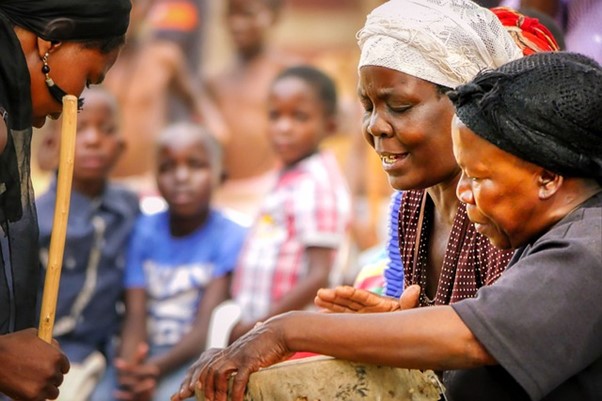As a study topic at all educational levels, including the higher institutional stage, Ewe (Èʋegbe) has gradually acquired popularity in Togo and Ghana. Ewe and Kabiye constitute Togo’s two indigenous languages, despite French being the country’s official language. French is also the advocated language for proper use in the media, schools, courts, and various organizations.
On the other hand, Ewe has developed into a significant indigenous language in southern Ghana, alongside Ga and Akan. It is the primary language used in adult learning programs, community media, radio and television programming, and literature disciplines.
The most common languages spoken by Ewe natives in Togo and Ghana are English and French, with a few being bilingual or multilingual. Furthermore, Ewe has evolved into a tool for comprehending the populations and cultures of both Togo and Ghana because of these factors.
Given that it is a part of the Gbe native languages and is spoken not just in Togo and Ghana but also in Benin and Nigeria, Ewe has become essential to studying literature from this vast area.
History and Origins of the EWE Language
There is roughly 2.7 million Ewe population in Ghana, 2.1 million in Togo, and 0.2 million in Benin, totalling 5 million. In both Nigeria and the Ivory Coast, the Ewe ethnicity is a minority.
According to some archaeological data, they originated in Oyo, Nigeria, in the 13th century. However, the present-day Ewe are thought to have arrived in Ghana in the early 17th century, per other oral and historical traditions. On the other hand, movements are considered to have begun in the 11th century. It is also speculated that the Ewe family may have travelled to South Sudan, Ethiopia, and Egypt.
The Ewe clan was split as boundaries were established by the British, Belgian, French, German, and Portuguese colonies during the 19th century. Thus, the Ewe-speaking population of West Africa resides between the Volta River in present Ghana and the Mono River at the western boundaries of the Ancient Kingdom of Benin.
As a result, the Ewe Individuals, like numerous other African ethnic communities, have developed unique languages and are subject to various political systems. When the Ewe population was split, this narrative was even adopted by Ewe tribes to claim that Ewe is the first group with one shared language. It is among their most well-known and thrilling tales of their exodus from King Agokoli’s dictatorship and Notsie’s enslavement.
Although the split has resulted in significant religious and cultural divergences, the Ewe tribe is nonetheless tightly bound together by their common language. Moreover, they are renowned for their colourful and distinctive customs and cultures.
Pronunciation and Alphabet
Ewe is commonly written using the Latin script, which is used in writing several other dialects like English. Ewe uses 30 letters, 23 of which are shared with English and other languages. However, in Ewe, the characters C, J, and Q are absent, and K, DZ, and KW are used in their place, accordingly. Moreover, the Ewe language uses seven characters that are not present in English; these comprise 2, 5, 6, ‘, 1, 4, and 3.
Generally, Ewe is a tone dialect, and tonal variations can alter the meaning of a word. Nevertheless, the tone won’t be recorded; instead, it will be picked up through listening to the verbal language. Furthermore, one can communicate without using tones.
Basic Grammar and Sentence Structure
The majority of grammatical connections in Éwé are denoted by word sequence or by particles because it is an isolated dialect. Many roots are made up of a single phrase (consonant + vowel). Besides, there aren’t many inflexions.
The grammar of nouns is relatively straightforward:
- Grammatical gender doesn’t exist, while the word order is used to express cases.
- The third-person plural pronoun is added to the singular noun to create the plural. In addition, the vocalic prefixes define the noun class, and neither definite nor indefinite articles exist.
- Vowels or nasal prefixes are frequently utilized when creating nouns using verbs.
On the other hand, word creation techniques like compounding, reduplication, and triplication are effective. For example, adjectives and deverbal nouns can be created by reduplicating verbs. Moreover, nominal compounds are highly prevalent.
Here are a few commonly used Ewé phrases and words.
- Good morning – ndi, mɔni
- Goodbye – hedenyuie
- Good afternoon – ŋdɔ
- Thank you – akpe
- Yes – ẽ
- No – ao, o
- Please – medekuku
- Man – ŋutsu
- Woman – nyɔnu
Some of the recommended resources for learning new Ewe words and phrases include;
https://www.youtube.com/@ceekokobooks/videos
https://www.scribd.com/doc/117310548/Basic-Ewe-for-foreign-students
https://en.wikivoyage.org/wiki/Ewe_phrasebook
https://wikitravel.org/en/Ewe_phrasebook
Practice and Immersion
Develop and strengthen your Ewe language abilities daily to grasp highly complex and advanced classes. You can practice speaking Ewe to learn multi-word verbs, compound adjectives, and several other words.
Generally, to take advantage of life’s possibilities, speaking Ewe naturally and effectively is crucial. Moreover, it would help if you spent time learning Ewe because it is the dialect that unites people worldwide.
Speaking fluent Ewe can make it easier for you to advance to better positions and receive more employment opportunities. Furthermore, it can enable you to pursue both domestically and overseas higher education.
Ewe also has many doors open because several people speak it worldwide. It could make it easier to live abroad. In other words, knowledge of Ewe will get you closer to accomplishing your desires.
Conclusion
Overall, Ewé is a language of superb communication where millions of people use it as their first dialect and others as a second. Moreover, the language is used in commonplace situations like marketplaces and in settings where traditional religion and culture are practised.
Therefore, learning or practising the Ewe language can help you improve your professional and personal life. Moreover, it will become easier to communicate with people in distant nations.
Do you want to learn the Ewe Language?
Cee Koko books and videos are a tremendous language-learning resource for anyone wanting to learn popular African languages and dialects.
Visit our shop to purchase your copy of the Ewe Interactive Book.



